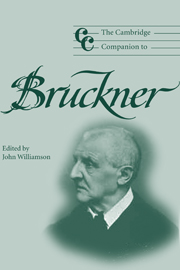1 - Introduction: a Catholic composer in the age of Bismarck
from Part I - Background
Published online by Cambridge University Press: 28 September 2011
Summary
Psychology and environment
Within the last two decades, the study of Bruckner and his music has begun to change radically. For long a generalized picture was current that depicted a simple religious man, ill at ease in society, an anachronism in his age who suffered neglect, misunderstanding, and the malice of critics. The martyrdom of the life bred the mysticism of the artist; the social anachronism became the timeless prophet. Much of this rested on flimsy evidence and critical misunderstanding. When the Bruckner number of Musik-Konzepte appeared in 1982, Norbert Nagler could still bemoan the tendency of anecdotes to swamp analysis. The evidence of recent Bruckner scholarship suggests that criticism and analysis of his music is now flourishing as never before, and with the full arsenal of modern techniques. Anecdotes have also to some extent given way to more complex questions in the area of biographical study. As a result interpretation has acquired new directions that are not simply to be traced in specialized Bruckner scholarship.
That Bruckner's life and times impinged upon his music is now a given of scholarship, and is reflected in the attention devoted specifically to his personality in recent conferences. At least one distinguished scholar has noted that this was not always the case. It is arguable that what has changed is the need to subscribe to one or other of the myths about Bruckner that enrolled him either as a mystic or as a simpleton. Such constructs lead to value judgements about the work; embarrassment at their inadequacy was just as likely to lead to an exclusion of the life from critical accounts.
- Type
- Chapter
- Information
- The Cambridge Companion to Bruckner , pp. 1 - 14Publisher: Cambridge University PressPrint publication year: 2004
- 1
- Cited by



